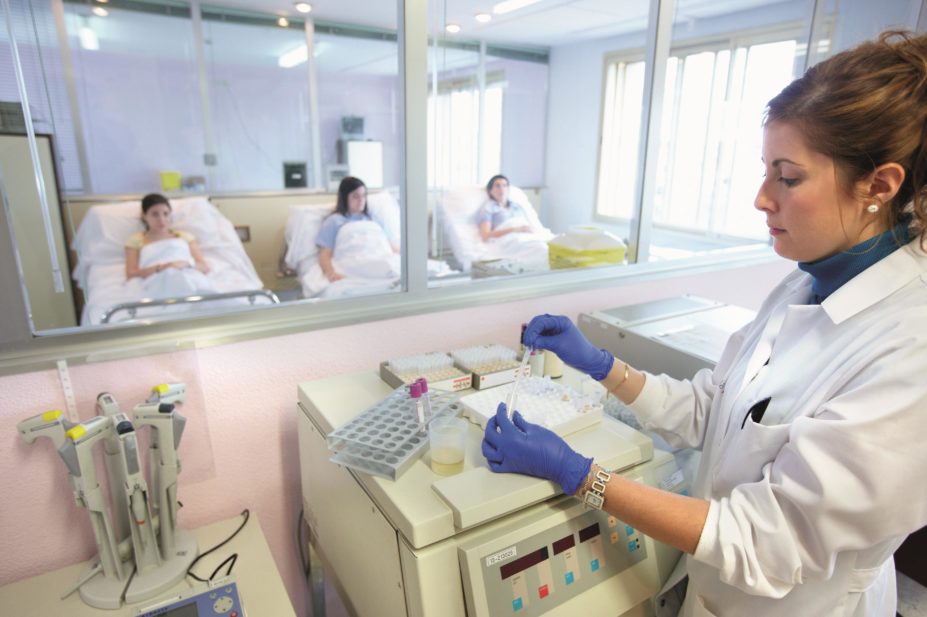
age fotostock / Alamy
Children born with Wolman disease, a genetic disorder in which patients cannot produce a specific enzyme, invariably die before their first birthday. However, clinical trials currently underway using the drug sebelipase alfa have seen some affected children living beyond their third year. The satisfaction of being involved with such trials, which give hope and radically change patients’ lives, is one of the highlights of being a clinical trials pharmacist, according to Carolyn Davies.
As senior pharmacist for clinical trials at Central Manchester University Hospitals NHS Foundation Trust, Davies oversees the delivery of around 200 studies. Aside from managing the clinical trials team and juggling the needs of those trials, she is responsible for risk assessing new trial protocols. This, she says, involves evaluating the feasibility of the study, including whether the hospital has adequate storage and the necessary equipment to handle trial drugs, and identifying clinical issues, such as whether the trial drug is already in use at the hospital and if its use will affect existing care pathways.
Most NHS trusts in the UK have some involvement with clinical trials. Larger acute trusts may be recruiting actively to more than 100 studies at a time, whereas smaller mental health trusts may run in the region of 5–20 trials, according to Tim Root, secretary of the National Pharmacy Clinical Trials Advisory Group, linked with the Royal Pharmaceutical Society (RPS) clinical trials network. However, dedicated clinical trials positions like Davies’ do not seem to be the norm. “Relatively few pharmacy staff have a specific clinical trials role, with clinical trials in their job title or job description,” Root explains, “although this number is growing slowly. However, many staff will be involved in clinical trial-related tasks as part of their normal roles, such as dispensing medicines, and will not be given dedicated time for these tasks.”
Trial coordination
Another clinical trials pharmacist, Ali Al-Hashimi, has a role split between Alder Hey Children’s Hospital, Merseyside, and the University of Liverpool. He started working in clinical trials during his first pharmacy role. “I enjoyed working with the latest innovations and practices,” he reflects, “and the difference [they make] to those patients who may have run out of other options.”
For the hospital, he conducts risk assessments for trials, trains staff who will be involved in those trials, writes trial-specific policies and procedures, and ensures trial medicines are available, suitably stored and packaged.
For the university, he is lead paediatric research pharmacist for the paediatric clinical research network, part of the NHS National Institute for Health Research (NIHR). In this role, he reviews new clinical trials submitted for inclusion to the NIHR portfolio, participates in writing protocols and trial-related documents, helps to source trial drugs and supports regulatory submissions — among other responsibilities.
There are no official data on the number of clinical trials pharmacists or technicians in the UK, although there are currently 237 pharmacists and 56 pharmacy technicians signed up to the RPS clinical trials network. Root believes that pharmacy staff involvement in clinical trials is growing. “Many trials now involve hi-tech medicines and innovative molecules, such as biologics and advanced therapy medicinal products,” he says. “Assuring safe storage, handling and clinical use of these compounds poses new challenges for pharmacy staff and resources and requires effective multidisciplinary working.”
For Al-Hashimi, the sourcing of suitably formulated active, placebo or comparator medicines for paediatric studies can be particularly challenging. “You need to ensure all drug excipients are appropriate for use in children, consider whether the taste of oral medicines is palatable for a child and think about the volume of administration for each drug.”
Managing trials
With participants from around 250 clinical trials receiving their medicines from University Hospital Southampton NHS Foundation Trust, it is no wonder the trust has a separate trials pharmacy and a 21-strong team of pharmacy staff supporting clinical research. Its clinical trials manager Joanna Cantle — a pharmacy technician — oversees the work of the team and acts as a central point of contact for anyone wishing to conduct a trial at the trust.
With such a large operation being undertaken, Cantle has devised a performance management tool that she uses to report to the trust’s research and development performance board, and to trial sponsors. It contains a monthly record of: active studies; new studies; trial protocols under review and amendments requested; items dispensed and actual dispensing times; customer satisfaction; and dispensing errors.
“These statistics provide assurance to trial sponsors regarding the quality of the service we deliver, and assurance to trust senior management about the output of the team,” Cantle explains.
Getting into clinical trials
Root thinks that demand for experienced clinical trials staff exceeds supply, although this gap is starting to close. “There is difficulty in finding and recruiting staff with clinical trials expertise,” he says.
Davies suggests: “Good communication skills are essential when working in clinical trials since you will need to deal with many people from both inside your hospital and outside it.” And she says that clinical trials pharmacists need to be well organised and methodical. “You also need to appreciate that the role involves a lot of paperwork and, particularly in larger research centres, minimal patient contact.”
She explains that clinical trials pharmacists should expect to undertake training in good clinical practice — an online course is provided by the NIHR. It takes around half a day to complete, she says, and should be repeated every two years. Longer courses involving taught learning are also available (for example, a three-day course is run by the University of Leeds).
“Until recently,” Root points out, “there has been little training designed specifically to meet the needs of pharmacy staff and support their core responsibility for investigational medicinal product management. The NIHR is about to launch a suite of new resources to meet this need.”
Cantle believes that, although experience within clinical trials would be desirable for an employer, it is not essential. “An interest in trials and an aptitude to learn are often sufficient,” she says. Working within clinical trials will develop your ability to multitask and manage deadlines, and gives you an understanding of the wider research picture — rather than simply the task of getting medicines to patients.
“I am also keen to instil a responsibility for good public relations among the staff; whenever they have contact with patients, sponsors, hospital staff or people from other organisations, they should recognise that they are representing the trust and a high level of customer service is expected.”
Al-Hashimi believes a background in clinical practice is a useful place to start. “Understanding how medicines get approved and how formularies are managed is useful,” he explains. “You need to be able to work to deadlines and be happy dealing with ambiguity — since you will often get asked questions to clarify grey areas for which you will need to apply policies and procedures to practical circumstances.”
For pre-registration trainees who are interested in clinical trials roles, Root recommends that they gain a good grounding in pharmacy practice to foundation diploma level or equivalent at the start of their careers. “They can then start looking for jobs which offer experience in clinical trials. These are most likely to be available in larger teaching trusts,” he says.
Expanding your options
Involvement in hospital trials provides a useful grounding for those who want to pursue a clinical trial role outside of the NHS, Al-Hashimi believes. “It gives a useful insight into how commercial companies operate — which will be beneficial if that career path is one that interests you. It can also generate opportunities to write articles and books, or become a researcher or clinical academic.”
Root says there is also an increasing need for pharmacists to support clinical trials in primary care settings, and suggests that the RPS Research Ready programme can help community pharmacists and pharmacies prepare for the opportunity.
He also believes that pharmacists involved in clinical trials have considerable opportunity to progress their career. “There is huge scope for pharmacists to develop their role in NHS research and development. There is no reason in principle why a pharmacist cannot be a principal investigator on a trial. It doesn’t happen very much at the moment, but there is no reason why it shouldn’t happen in the future.”
Approving clinical trials in the UK
Requirements for the conduct of clinical trials in the European Union are provided in the Clinical Trials Directive 2001/20/EC. This directive was transposed into UK law as ‘The Medicines for Human Use (Clinical Trials) Regulations 2004’. Authorisation to conduct a clinical trial requires submission of a clinical trial authorisation (CTA) application to ‘the competent authority’. In the UK, this is the Medicines and Healthcare products Regulatory Agency (MHRA).
At present, Davies explains, researchers require approval from the MHRA and a favourable opinion from a research ethics committee before commencing a trial. Separate approval is also needed from the local research and development department at every site at which the trial will be delivered.
This process will be streamlined later in 2015 as a new approval process is rolled out, overseen by the Health Research Authority (HRA), which protects the interests of patients in health research. At the moment, each hospital does its own clinical trial risk assessment — which results in repetition of work across the country. In the future, research companies will need to have more information finalised before they approach sites. “This will reduce the need for local hospitals to chase information to resolve feasibility issues,” Davies predicts. “However, there will still be medicines management and local handling issues to resolve locally.”
Approval from the HRA will provide central approval for all NHS providers in England, meaning local approval will not be necessary. This will not affect MHRA approval, which will remain necessary for all trials in the UK.


